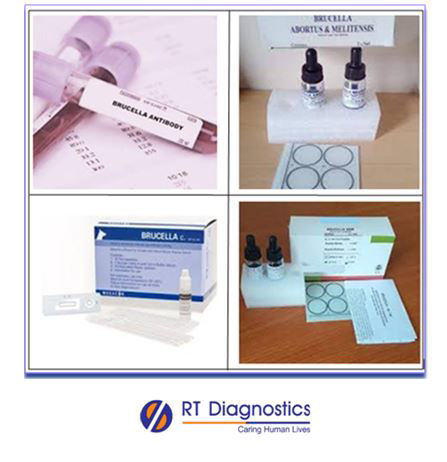Brucella - IgM Antibody
Brucella antibodies are produced by the immune system against brucellosis (zoonotic disease). The disease brucellosis is caused by domestic animals. Consumption of meat and its milk products contaminated with infected brucella bacteria spreads this disease. This screening test evaluates the brucella IgM antibody in the blood, helps to diagnose brucellosis.
BRUCELLA IgM ANTIBODY:
Why Brucella IgM Antibody Test?
CLINICAL INFORMATION
Brucellosis is a systemic bacterial infection (zoonotic disease) caused by handling domesticated animals (livestock) or consumption of milk products (unpasteurized dairy products) infected with Brucella bacteria. It is gram-negative coccobacilli of the genus Brucella. Domestic animals serve as reservoirs of Brucella species such as Brucella melitensis (infects goats), Brucella abortus (infects cattle), Brucella suis (infects swine), and Brucella canis (infects dogs). Clinical manifestations of brucellosis are fever, chills, sweats, malaise, weight loss, headache, and weakness. If untreated, in the latent stage Brucella bacteria can damage the heart, joints, or brain. Brucella infection during pregnancy can lead to miscarriages or can also infect unborn children. Diagnosis of Brucellosis is made by detection of rising high titers of specific antibodies (Anti-Brucella antibodies) against virulent antigenic determinant (S-LPS i.e smooth lipo-polysaccharide) by ELISA method and the Coombs test. S-LPS antigen can detect antibodies to three major Brucella species that share a common epitope (Antigenic Determinant). During acute infection by Brucellosis, IgM antibodies appear during the first week. As the systemic infection progresses, class switching of antibodies subtypes occurs from IgM to IgG antibody. Brucella IgM Antibody test helps in the diagnosis of acute human Brucellosis. The use of enzyme-linked immunosorbent assay (ELISA) has become a widespread screening tool in the detection of Anti-Brucella antibodies. Brucella micro-agglutination test (BMAT) is a modified version of serum (tube), agglutination test (SAT) that can detect antibodies to Brucella species – abortus, melitensis or suis, while there is no serological test available to test B.canis. Rose Bengal test is a confirmation method used for human Brucellosis. It is a rapid slide-type agglutination assay test performed with a stained B.abortus suspension that forms agglutination (clumps formed due to antigen-antibody complex) when human serum (antibodies) of suspected patient’s sample specimen is added in case of Brucellosis. The other tests include X-rays which can reveal changes in bone and joints, BMA – bone-marrow aspiration cytology (Histo-pathological studies) is performed in chronic infection (certain advanced cases of neglected Brucella infection) or past infection. During CNS manifestation, aspiration of CSF sample specimen is performed (to rule out a differential diagnosis).

General instructions:
Sample Requirement: Specimen - Blood sample collected from the vein. Test Preparation: None.
NOTE - Sample for specimen collections may vary based on the patient’s condition/cases according to the patient’s presenting complaints/signs or symptoms:
SPECIMEN REQUIREMENT (Special or Rare Cases) - As instructed and guided by Physician / Clinician / Pathologist / as per Laboratory’s requirements, according to procedures and protocols.
Sample Requirement: Blood sample taken from the vein
Test Preparation: None
This Multi-Specialty Clinical Referral Laboratory RT DIAGNOSTICS provides precise and accurate tests with an extensive range of testing services to the medical centers to help in the diagnosis and identification of pathology in the test specimens for infectious diseases and also to evaluate the function of organ systems of the patient. It prevents further complications and helps to stabilize and restore health to near normalcy at the earliest without delay.



